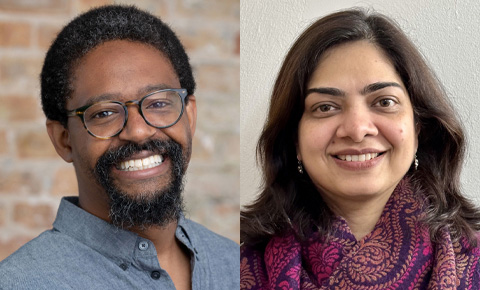Brown, Tripathi Take First Place in Case Competition

Northwestern University scholars Ahmmad Brown and Ritu Tripathi received first place and a $10,000 prize in the 2024 University of Michigan Global DEI case competition for prompting students to think about how hard it can be to implement new equity policies in global organizations.
Brown and Tripathi, both assistant professors of instruction at Northwestern’s School of Education and Social Policy, crafted a case study and a corresponding teaching note using the story of Maya Marshall, the Chief People and Diversity, Equity, and Inclusion officer at a multinational company.
Marshall, charged with keeping women in the workforce and in the running for top leadership positions, decided to offer paid parental leave. But she faced unexpected obstacles to the policy, including diverse cultural views and reservations from those who would have benefited from it.
“We found a workplace bias occurs against people who make use of these policies, and that really resonated with us,” Tripathi said. “When women leave to fulfill childbearing or caregiving roles, their promotion chances are jeopardized and even the beneficiaries tend to hesitate to use them because of the bias. But there’s no objective basis -- it’s a visceral attitude of negativity against the user.”
The case, prepared to generate thoughtful class discussion and debate rather than prescribe solutions, was published on Michigan's WDI platform. It illustrates some of the tensions involved in DEI work and frames diversity, equity and inclusion work in a way that doesn’t necessarily align with prevailing public narratives, Brown said.
“The day-to-day of chief diversity officers at large complex multinational organizations typically doesn’t include ideological debates about the role of gender or race in society,” Brown said. “Instead, DEI is a lens to think about how to best support people, so they can succeed and advance. In the context of our case, what does support for women look like structurally?”
The case is especially timely because the DEI space is at an inflection point, Brown added. “There’s nothing in this case about training or workshops. It’s a strategy case, and we ask students to consider the cultural questions that arise given the variation between countries —such as the differing notions of the individual vs. the collective-— related to paid parental leave.”
Brown, a sociologist in the Masters and Executive Learning and Organizational Change programs at the School of Education and Social Policy, studies inequality in organizations and interventions to support inclusion and belonging. He is also the faculty lead for the Leading Equity and Inclusion in Organizations Certificate (LEIOC) program.
Tripathi is an expert in organizational behavior and cross-cultural psychology. She has developed and taught courses on global leadership, international negotiations, and cross-cultural management for both the undergraduate and professional master’s programs.
She and Brown co-teach the course Leading Global Change for the Master’s in Learning and Organizational Change program and serve as capstone advisors.
The case study “Global Firm and Local Labor: Delivering Paid Parental Leave” will be used in Master’s in Learning and Organizational Change classes as well as undergraduate courses.